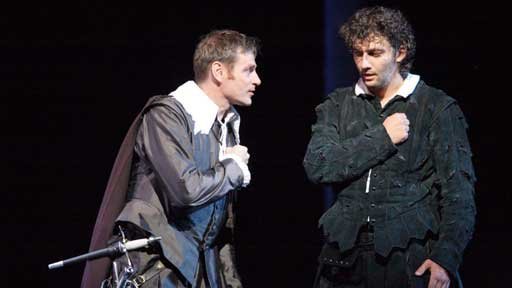|
|
|
|
|
|
|
|
| Financial Times, 16 September
2009 |
|
|
|
Don Carlo, Royal Opera House, London
|
|
Italian opera has never been more popular. It
has also never been in greater need of Italian voices. No matter how good
the alternatives, a home-grown voice, properly schooled, transforms the
sound of Verdi. It is not just the diction or timbre. It is the tradition,
and Ferruccio Furlanetto embodies it as well as any singer today. That is
what makes his King Philip in the Royal Opera’s Don Carlo so compelling.
Furlanetto never used to have this sort of stature. He has grown into it, to
the point where he can act and sing everyone off the stage. It wouldn’t
matter what kind of costume or production he was in. Thanks to his vocal
authority and histrionic command, none of it self-serving, he lets us see
behind the façade of kingly power to the anguish and vulnerability beneath.
It is called humanity – a three-dimensional quality that seamlessly
harmonises voice and movement, sound and style, foreground and background.
As in 2008, when the production was new, Furlanetto is the reason to catch
this first revival. Marina Poplavskaya repeats her Elizabeth, more confident
now, but also more susceptible to vocal swooning, and Simon Keenlyside’s
Rodrigo once again enlivens every scene in which he appears. Neither is
identifiably Italianate in style or timbre. Nor is the Carlo of handsome
newcomer Jonas Kaufmann, whose singing – technically refined and musicianly
– never reveals a beating heart beneath the cultured surface.
(but there it is, right there :-))

John Tomlinson contributes a patriarchal Grand Inquisitor, Marianne
Cornetti a ballsy, blunt Eboli.
The most successful newcomer is Semyon Bychkov, whose conducting of
Lohengrin was one of last season’s outstanding memories. He stamps his
authority over every bar: the inner orchestral parts, especially Verdi’s
flute and harp decorations, are a constant joy. He is equally considerate of
the singers, but it may take a couple of performances for his steady tempi
to take wing in the way he intends.
The chorus makes a good start to the season, but Nicholas Hytner’s staging
of the five-act version, dressed in garish prefab sets and museum-piece
costumes, remains earthbound. Why is it that successive National Theatre
directors, upon entering the Royal Opera House, automatically capitulate to
operatic convention? Rating: 3/5 |
|
|
|
|
|
|
|
|
|
|
|
|
|
|
|
|
|
|